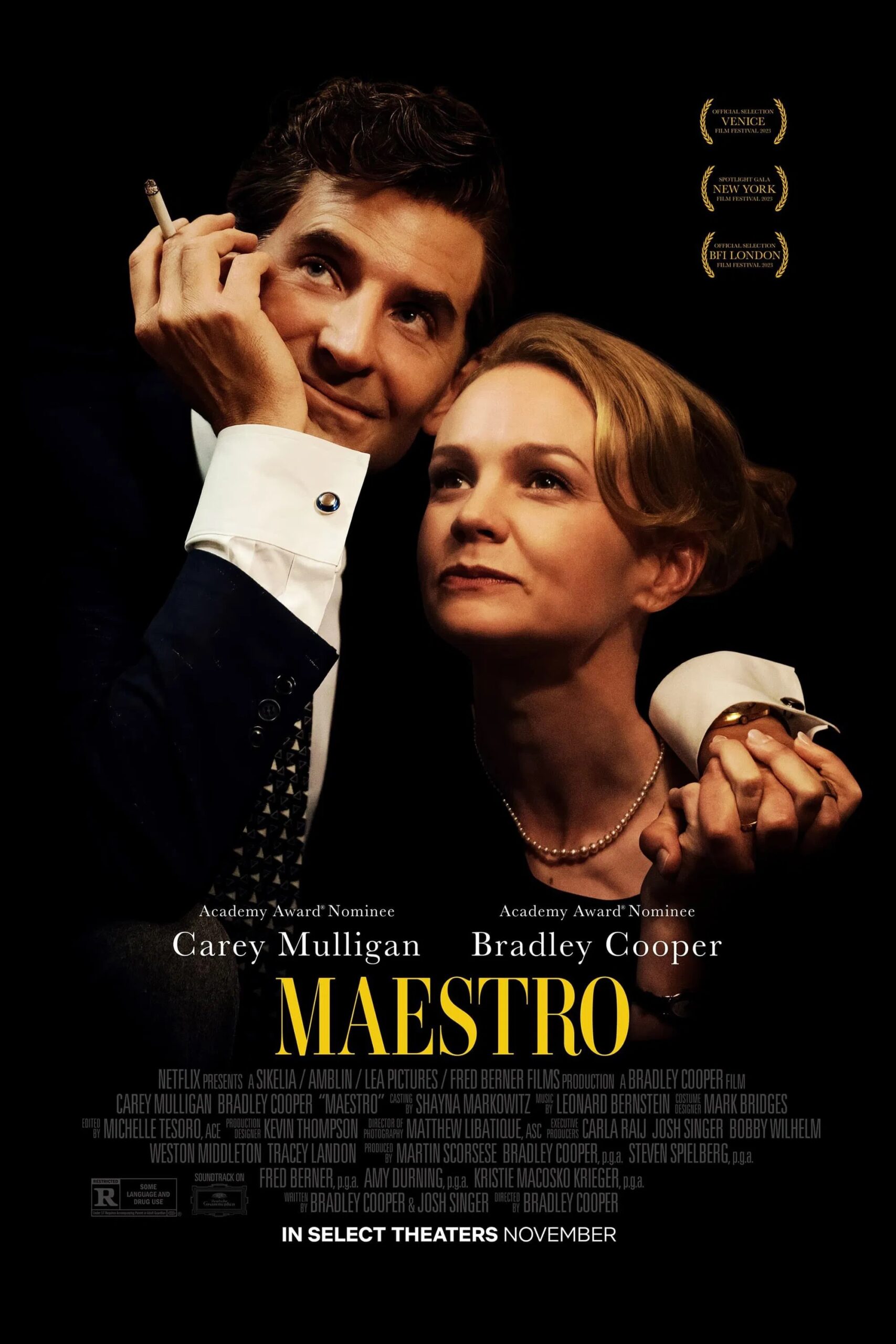Maestro takes us on a musical journey of two different lives, one gnawing at the other, trying to survive in an environment where neither can truly win. A constant battle of sentiment versus obligation takes place in every scene—each moment forcing us as the audience to weigh whether what we’re seeing is noble or selfish, righteous or destructive. Yet, in asking us to make that judgment, the film slyly removes the possibility of a “correct” answer, showing that such a morally complex existence cannot be boiled down to right or wrong. A life, for one, is a life they must choose—and without choice, there is no freedom.

Bradley Cooper commands the screen as Leonard Bernstein, inhabiting a man whose genius was both his greatest gift and his deepest curse. Cooper’s Bernstein is a creature of contradictions: a man openly struggling with his identity as a bisexual man during an era when such openness could destroy a career, tarnish a public image, and fracture a personal life. His queerness is not treated as a scandalous subplot but as a constant undercurrent in his life—an invisible tether pulling at him in moments of triumph and vulnerability. We see how his affections toward men, though sincere and real, had to be veiled behind layers of public charm and carefully curated self-presentation. The fear was not only societal—it was deeply personal. In an America still thick with prejudice, Bernstein lived in a constant state of guarded authenticity, showing just enough to feel alive but never enough to feel safe.

The film also subtly reflects the weight of Bernstein’s Jewish heritage, a fact that during the mid-20th century carried its own set of anxieties. While Bernstein achieved incredible fame, he did so in a time when antisemitism was still deeply woven into the cultural fabric of the West. His heritage was both a source of pride and a potential liability, shaping the way he navigated elite artistic circles, political climates, and personal relationships. We feel how this quiet but persistent fear may have contributed to his relentless drive to prove himself—to transcend prejudice not just through talent, but through sheer force of will.

In his personal life, Bernstein’s open admission of his dislike for his father feels like a raw nerve running through his relationships. That rejection of paternal influence doesn’t just explain his distance from certain family members—it creates an emotional vacuum that bleeds into his marriage and parenting. Love, in Bernstein’s world, often comes tangled with a kind of defensiveness, as if the vulnerability of relying on someone could betray him later.

Carey Mulligan’s staggering performance as Felicia Montealegre is the emotional heartbeat of the film. She doesn’t play Felicia as a woman simply standing in her husband’s shadow; she plays her as someone with her own gravitational pull. Their connection is shown to be deeper than a romantic ideal—it’s a bond forged in intellectual kinship, artistic admiration, and mutual recognition of the other’s brilliance. And yet, that bond is tested in ways that defy conventional marriage dramas. Felicia was no stranger to Leonard’s affairs with men, nor to the complexities of loving someone whose emotional compass was always in motion. Still, her loyalty, though often wounded, remained steadfast, even as the cracks in their marriage widened. Her eventual passing is portrayed not as the closing of a chapter but as the dimming of a light that had illuminated Bernstein’s world in ways no one else could.

The supporting cast carries the film with equal dedication. Matt Bomer brings quiet elegance to David Oppenheim, whose chemistry with Cooper’s Bernstein lingers in the air long after their scenes together. Maya Hawke, in a smaller but memorable role as Bernstein’s daughter, captures the ache of growing up in a household where love and chaos were inseparable. Every performance, from the main players to the smallest cameos, seems infused with the same reverence for the material—each actor a note in the symphony that is Maestro.

But perhaps the most lasting achievement of the film is how it reminds us of the multitude of lives Bernstein touched—through his music, his teaching, his activism, and his unapologetic pursuit of love in a creatively fractured world. His lessons, both artistic and personal, still resonate: the insistence on living fully in one’s art, the courage to break molds even when they’re comfortable, and the understanding that greatness often comes at great personal cost.

Maestro serves not just as a biopic but as a requiem for the contradictions of human life. It is a portrait of a man who could not fit neatly into any role he played, a man who loved fiercely, worked obsessively, and lived in the tension between freedom and fear. The film never lets us forget that behind the genius, behind the public charisma, there was a human being grappling with the same insecurities, prejudices, and yearnings we all face—only on a stage where the world was always watching.
